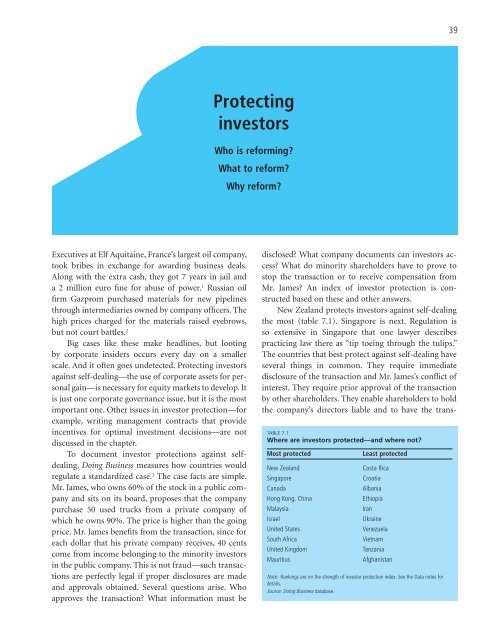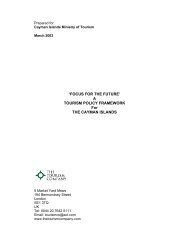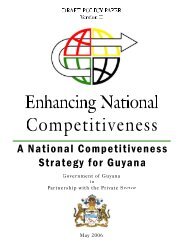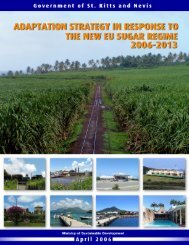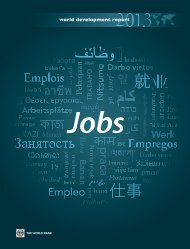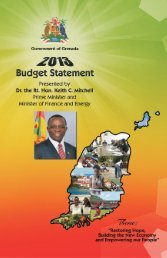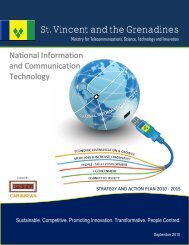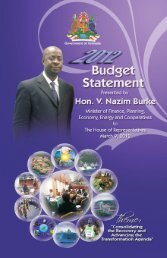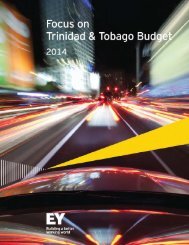Creating
Doing Business in 2006 -- Creating Jobs - Caribbean Elections
Doing Business in 2006 -- Creating Jobs - Caribbean Elections
You also want an ePaper? Increase the reach of your titles
YUMPU automatically turns print PDFs into web optimized ePapers that Google loves.
39<br />
Protecting<br />
investors<br />
Who is reforming?<br />
What to reform?<br />
Why reform?<br />
Executives at Elf Aquitaine, France’s largest oil company,<br />
took bribes in exchange for awarding business deals.<br />
Along with the extra cash, they got 7 years in jail and<br />
a 2 million euro fine for abuse of power. 1 Russian oil<br />
firm Gazprom purchased materials for new pipelines<br />
through intermediaries owned by company officers. The<br />
high prices charged for the materials raised eyebrows,<br />
but not court battles. 2<br />
Big cases like these make headlines, but looting<br />
by corporate insiders occurs every day on a smaller<br />
scale. And it often goes undetected. Protecting investors<br />
against self-dealing—the use of corporate assets for personal<br />
gain—is necessary for equity markets to develop. It<br />
is just one corporate governance issue, but it is the most<br />
important one. Other issues in investor protection—for<br />
example, writing management contracts that provide<br />
incentives for optimal investment decisions—are not<br />
discussed in the chapter.<br />
To document investor protections against selfdealing,<br />
Doing Business measures how countries would<br />
regulate a standardized case. 3 The case facts are simple.<br />
Mr. James, who owns 60% of the stock in a public company<br />
and sits on its board, proposes that the company<br />
purchase 50 used trucks from a private company of<br />
which he owns 90%. The price is higher than the going<br />
price. Mr. James benefits from the transaction, since for<br />
each dollar that his private company receives, 40 cents<br />
come from income belonging to the minority investors<br />
in the public company. This is not fraud—such transactions<br />
are perfectly legal if proper disclosures are made<br />
and approvals obtained. Several questions arise. Who<br />
approves the transaction? What information must be<br />
disclosed? What company documents can investors access?<br />
What do minority shareholders have to prove to<br />
stop the transaction or to receive compensation from<br />
Mr. James? An index of investor protection is constructed<br />
based on these and other answers.<br />
New Zealand protects investors against self-dealing<br />
the most (table 7.1). Singapore is next. Regulation is<br />
so extensive in Singapore that one lawyer describes<br />
practicing law there as “tip toeing through the tulips.”<br />
The countries that best protect against self-dealing have<br />
several things in common. They require immediate<br />
disclosure of the transaction and Mr. James’s conflict of<br />
interest. They require prior approval of the transaction<br />
by other shareholders. They enable shareholders to hold<br />
the company’s directors liable and to have the trans-<br />
TABLE 7.1<br />
Where are investors protected—and where not?<br />
Most protected<br />
New Zealand<br />
Singapore<br />
Canada<br />
Hong Kong, China<br />
Malaysia<br />
Israel<br />
United States<br />
South Africa<br />
United Kingdom<br />
Mauritius<br />
Least protected<br />
Costa Rica<br />
Croatia<br />
Albania<br />
Ethiopia<br />
Iran<br />
Ukraine<br />
Venezuela<br />
Vietnam<br />
Tanzania<br />
Afghanistan<br />
Note: Rankings are on the strength of investor protection index. See the Data notes for<br />
details.<br />
Source: Doing Business database.


